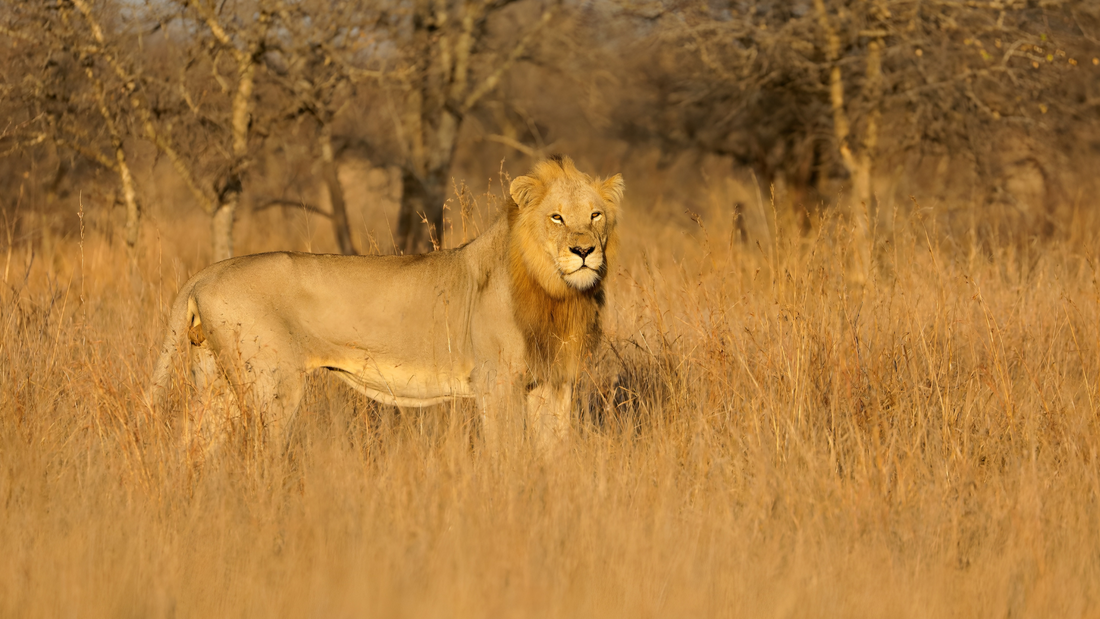
The Plight of Africa's Lions: Understanding the Decline and Taking Action
Share
My life in Africa was a dream come true. The two years we spent with my husband doing volunteer work at Saint Joseph’s Commercial feel like a drop in the ocean of our lives, yet they had such a big impact. This was back in 2001, and I still feel Africa calling me. I haven’t been able to return since 2003, although I hope one day I can go back and revisit all the places that brought me so much happiness. We were fortunate to visit the Serengeti and Ngorongoro and see the majestic African wildlife in its natural habitat. How sad that we humans are claiming everything for ourselves everywhere on this planet. If our race continues increasing at this rate, soon we will be the only species left on it. The African lion is just another species added to the list threatened by our existence. Fortunately, there are still many humans working hard to stop and reverse the damage caused by others. Join us in trying to make a difference; it’s not too late yet.
Current Lion Population
Estimating the exact number of lions in Africa is challenging due to the vast and remote habitats they inhabit. However, experts estimate that there are between 20,000 to 25,000 lions left in the wild across the continent. This number is a stark decline from historical populations.
Rate of Disappearance
The rate at which lions are disappearing from Africa is alarming. Over the past century, lion populations have declined by approximately 90%. This rapid decline is primarily attributed to habitat loss, human-wildlife conflict, poaching, and trophy hunting.
Causes of Decline
1. Habitat Loss: As human populations expand and land is converted for agriculture, settlements, and infrastructure development, lion habitats shrink. This fragmentation isolates lion populations, leading to reduced genetic diversity and increased vulnerability to extinction.
2. Human-Wildlife Conflict: Encounters between lions and humans often result in conflict, particularly in areas where communities rely on livestock for their livelihoods. Retaliatory killings by farmers and herders in response to livestock predation further threaten lion populations.
3. Poaching: Illegal poaching for lion body parts, such as bones and skins, persists due to demand in traditional medicine and cultural practices. Additionally, lions are sometimes targeted by trophy hunters for their majestic appearance.
What Can Be Done:
1. Habitat Protection: Safeguarding lion habitats through the establishment and management of protected areas is crucial. Conservation organizations and governments must work together to create and maintain connected wildlife corridors to facilitate the movement of lion populations.
2. Community Engagement: Engaging local communities in conservation efforts is essential for mitigating human-wildlife conflict. Implementing livestock management strategies, providing alternative livelihoods, and promoting coexistence can help reduce retaliatory killings of lions.
3. Combatting Poaching: Strengthening law enforcement efforts to combat poaching and illegal wildlife trade is imperative. This includes increasing penalties for wildlife crimes, enhancing monitoring and surveillance, and raising awareness about the importance of lion conservation.
4. Sustainable Tourism: Responsible ecotourism can generate revenue for local communities while supporting lion conservation efforts. Tourism initiatives that prioritize wildlife protection and contribute to community development can provide incentives for conservation.
How You Can Help Save Africa's Lions
1. Support Conservation Organizations: Donate to reputable conservation organizations dedicated to lion conservation efforts. Your contributions can fund research, habitat protection, community engagement, and anti-poaching initiatives.
2. Raise Awareness: Spread the word about the plight of Africa's lions and the importance of their conservation. Use your voice on social media, participate in awareness campaigns, and educate others about the threats facing lions and what can be done to protect them.
3. Choose Responsible Tourism: When planning a safari or wildlife adventure, opt for responsible tour operators that prioritize conservation and ethical wildlife viewing practices. Choose accommodations and tour packages that support local communities and wildlife conservation initiatives.
4. Support Sustainable Products: Purchase products that are certified as sustainable and environmentally friendly. Look for certifications such as Fair Trade, Rainforest Alliance, or Forest Stewardship Council (FSC) when buying wood products to ensure they come from responsibly managed forests.
5. Reduce Your Ecological Footprint: Make conscious choices to minimize your impact on the environment. Reduce, reuse, and recycle to decrease waste, conserve water and energy, and choose eco-friendly products whenever possible.
6. Advocate for Policy Change: Support policies and legislation that promote wildlife conservation and habitat protection. Write to policymakers, participate in advocacy campaigns, and vote for candidates who prioritize environmental conservation.
7. Support Local Communities: Support initiatives that empower local communities living alongside lions. This can include supporting sustainable livelihood projects, providing education and healthcare, and fostering partnerships for community-based conservation efforts.
8. Stay Informed and Engaged: Stay informed about developments in lion conservation and continue to educate yourself about the issues facing these majestic predators. Join conservation groups, attend workshops and conferences, and stay engaged with ongoing conservation efforts.
Every action, no matter how small, can make a difference in the fight to save Africa's lions. Together, we can ensure a future where lions continue to roam the African savannahs for generations to come.
Africa's lions are facing unprecedented threats to their survival, but it's not too late to act. By addressing the root causes of their decline and implementing effective conservation strategies, we can ensure a future where lions continue to roam the African savannah. Together, let's work towards protecting these iconic predators and preserving the rich biodiversity of our planet.
Stay connected with Fitz & Willow for more nature and wildlife updates! Follow us on social media and never miss out on our latest adventures and tips for embracing the great outdoors. Join our community and stay tuned for exciting content to inspire your love for nature. 🌿🦉 #FitzWillow #NatureLovers #WildlifeUpdates
